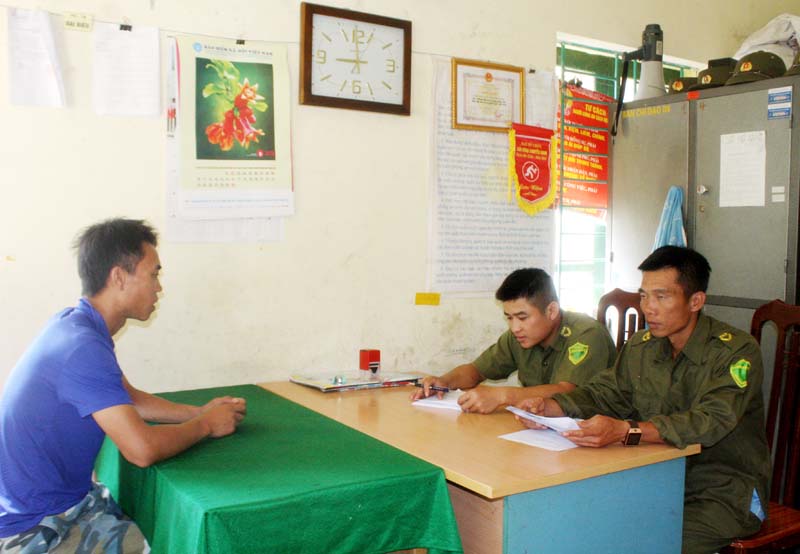
With the initiative and aggressiveness in the struggle to prevent and control the drug crimes, Thung Khe commune is still one of the "clean" areas of drug in Mai Chau district.
 The police staff of Thung Khe commune (Mai Chau) has been on
duty and welcoming the citizens to promptly grasp the situation and take the
preventive measures in case of the incident.
The police staff of Thung Khe commune (Mai Chau) has been on
duty and welcoming the citizens to promptly grasp the situation and take the
preventive measures in case of the incident.
There is the National Highway 6 running through Thung Khe
commune, which has made it a hot route for illegal drug trafficking. Drugs have
penetrated a lot of neighboring areas. However, with the great vigilance of the
Party Committee, the appropriate authorities and the people, Thung Khe people
are still proud because their land is still "immune" from drugs.
In order to get the above achievement, Mr. Ha Van Hung, the
Chairman of Thung Khe People's Committee says that every year, in the plan for
the law propaganda, dissemination and education, the Law on Drug Prevention and
Control is the key content. In addition to the symposia, the propaganda is
regularly integrated in the meetings of the helmets and residential areas. In
the hamlets and residential areas in the commune, the effective operation of 10
self-managed security teams has been maintained for many years. In addition,
Thung Khe commune joined a security cluster in a row of 6 communes of Mai Chau
and Tan Lac districts in 2016. Thanks to strengthening the coordination in
grasping information and preventing the crimes, it has helped 6 adjacent
communes of 2 districts to maintain the security situation, as well as
effectively fight against the drug-related crimes.
For the model of the group for the self-management security,
this is the main nucleus in the propaganda of the law and struggle against the
different types of crimes in the commune. The team is established on the basis
of self-managing inter-family group. In addition to participating in patrolling
and controlling during the peak occasions, the team has built the close
relationships among the members through the support and assistance in everyday
tasks such as funerals and weddings. This also facilitates the members to
remind each other to fight and prevent the drug intrusion.
From the beginning of the year until now, the security
situation in the commune is still ensured, there are not any drug-related
subjects and cases.
More than just an information technology teacher, Bui Van Nien is an inspiring figure who has nurtured the scientific curiosity and creative spirit of students in Vietnam’s ethnic minority communities.
Da Bac is the most disadvantaged mountainous district in Hoa Binh province, with ethnic minorities accounting for about 90% of its population. Over the past years, the district has mobilised resources to implement ethnic policies to improve the quality of life of local people.
In recent years, Hoa Binh province has consistently prioritised the protection, care, and education of children, particularly those from ethnic minorities and disadvantaged backgrounds, by creating a safe, healthy, and nurturing environment for their all-round development.
The Steering Committee for Tobacco Harm Prevention and Control of Hoa Binh province, in coordination with the Tobacco Harm Prevention and Control Fund, held a ceremony on May 28 in response to the World No Tobacco Day (May 31) and the National No Tobacco Week (from May 25 to 31). The event was chaired by Nguyen Van Toan, Standing Vice Chairman of the provincial People’s Committee and head of the Steering Committee.
Since 2021, the Center for Industrial Promotion and Industrial Development Consulting (CIIDC) under the Department of Industry and Trade has been implementing a school lighting model as part of the plan for using energy efficiently and economically in Hoa Binh Province in the pẻiod of 2021 - 2025. This model not only aims to improve the learning conditions and enhance the education quality, but it also promotes the message of energy saving, energy security, environmental protection and contributes to the goals of socio-economic development.
In the 2024 - 2025 school year, the entire Hoa Binh provincial education sector includes 520 educational institutions and schools. Among them are 13 ethnic boarding schools with 153 classes and 4,487 students. Four of these schools have met national standards, reaching 30.7 percent.



 The police staff of Thung Khe commune (Mai Chau) has been on
duty and welcoming the citizens to promptly grasp the situation and take the
preventive measures in case of the incident.
The police staff of Thung Khe commune (Mai Chau) has been on
duty and welcoming the citizens to promptly grasp the situation and take the
preventive measures in case of the incident.